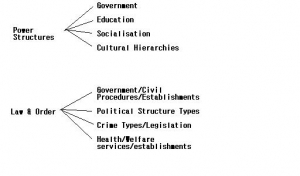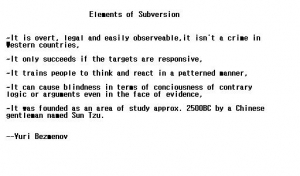In April 2010 Korea signed an MOU with the World Bank to propagate ICT in developing countries for the transformation of those countries. But how does the unveiled, at Global Smart 2010, U-City plan for Korea stack up in terms of what it transforms Aside from the gloss talk on the obviously successful Korean Digital strategy, there is a deeper dialogue.
Subversion is the aggressive undermining of systems. According to Yuri Bezmenov, as cited on youtube, a country can be subverted in the following areas and wind up changed: Education, religion, law and order, power structures and labor relations. This article looks at how the U-City plan might transform in terms of what it may subvert.
To subvert: Indigenous religion must be ridiculed and replaced with small cults to detract.
K U-City: Not expressly implied.
To subvert: Education should not be pragmatic.
K U-City: Not expressly implied.
To subvert Power Structures, should take away links between people and replace with bureaucracy.
K U-City
a) Social networking, a component of U-IT, subverts socialisation and ways of socialising essentially replacing with a bureaucracy if a bureaucracy is viewed in terms of changing the way thing are managed. Further, goverments have made it their realm to initiate subtle attempts at underming social behavior and culture by attempts at policing behaviors they have not had control of before, in most countries anti-cyberbullying is a rule system based on adverse adherence punishment, yet in Korea, the goal of the anti-cyberbullying program, which is a fair thing to police normally, is sunny-ness, positive comments made to people. This could be viewed as an undermining of social hierarchies by the assumption that it is government that knows best, thereby a subtle relinquishing of a type of power.
b) Distance education entails a new bureaucracy and disestablishes human links.
c) e-govt. used for the express purpose of staff reductions destroys human links and replaces with bureaucracy.
d) U-IT/IPTV entails a new bureaucracy and disestablishes human links.
To subvert law and order should consist of moral relativity and a slow substitution of moral principles.
K U-City
a) e-govt/civil processes introduce new 'game like' rules where if a system malfunctions a civil servant might, irrespective of the law, willfully ignore crime. This oversight is remedied in the Korean situation where all those in Korea are required to report all crimes, a higher law, though the 'game like' rules could prolong a process if abused via ignorance [who knows everything right] or purposefully. This is a type of subversion of moral principles as it is subject to moral relativity via the introduction of a perception of choice in law adherence as the system if new and anomalies untested. E-civil processes, if the humans operating them abide by law, do not appear to impact moral relativity adversely.
b) RFID if employed beyond bracelets on convicts, the subject of which is an international debate, could be open to abuse by ill intentions or a collapse in exercise of political structure type. The use of RFID for citizen law and order is more open to the abuse end of the spectrum in terms of moral relativity and a subsequent substitution of moral principles.
c) U-IT/IPTV initiates new crime. As I write this there are two unknown and unwanted c2c networks snooping the notebook I write on, one traceable to Yongsan, the other to California.
d) U Health/Welfare is one of the systems like a) that are as good as the people operating them. New rules or 'game like' rules are not yet apparent. Could be subject to the same caveats as a).
To subvert labor relations, bargaining and negotiation between employer and employee or buyer and seller should be destroyed and replaced with a third party..
K U-City Not expressly implied.

This discussion does not conclude that the goal of U-City is to subvert, it looks at what it might subvert in an effort to table what that means. The main areas that appear to be able to be subverted under the U-City plan are power stuctures in the way we relate to goverment, educators, socially and social skills as well as culture and cultural hierarchies. Also, law and order might be subverted via surveillance, relation styles with civil servants, political stucture types, crime types and prevention remedies as well as ways of relating to health and welfare practitioners. I have no space for a longer discussion. It might be asked, well this is all very nice and you drew a nice diagram, but what does it mean It means that the U-City plan is capable of subverting and subversion comes with tangible, as the Korean government knows, and intangible costs. The example question I leave you with is what is the immediate and long term cost of goverment control of polite behavior in a online culture Remembering that this is an element of socialising that the government has absolutely never had a say in, until now. This is one of the overt subversion of socialisation elements directly attributable to the U-City infrastructure. What are the costs of potential subversion of all of these things compared to the gains Is the subversion taking Korea where it wants to go



